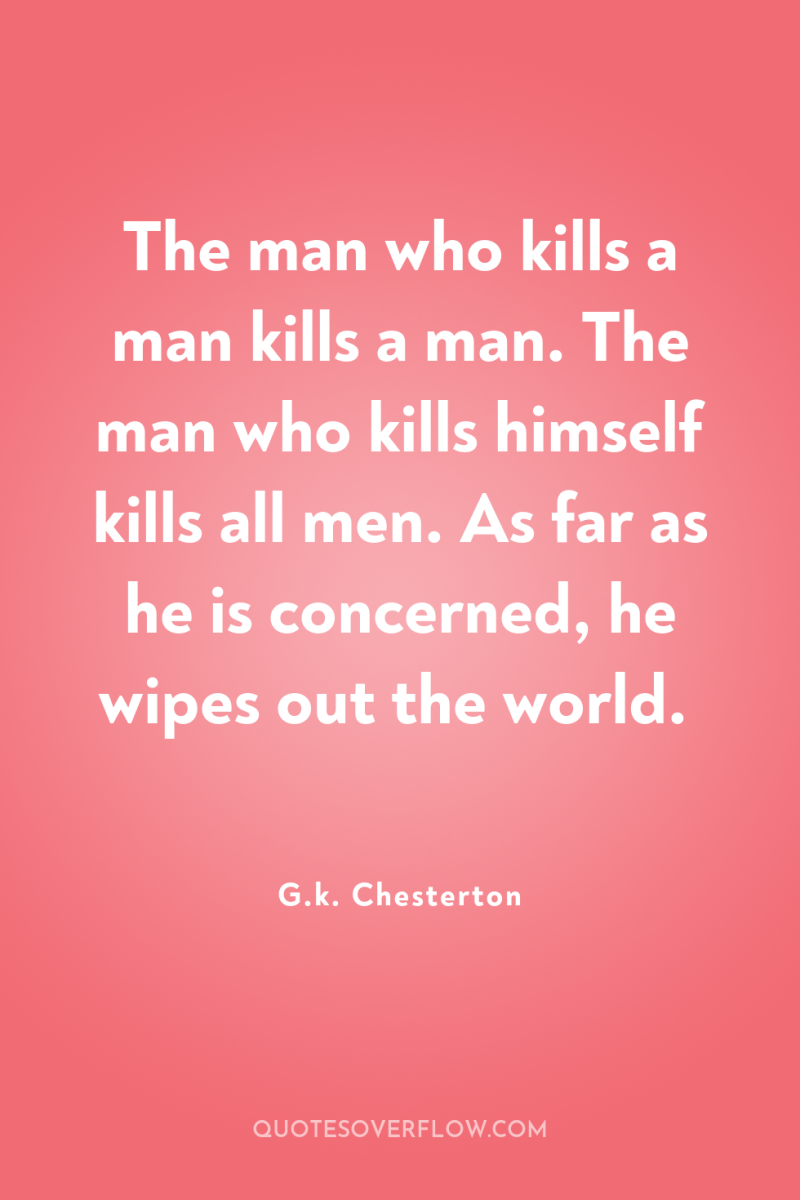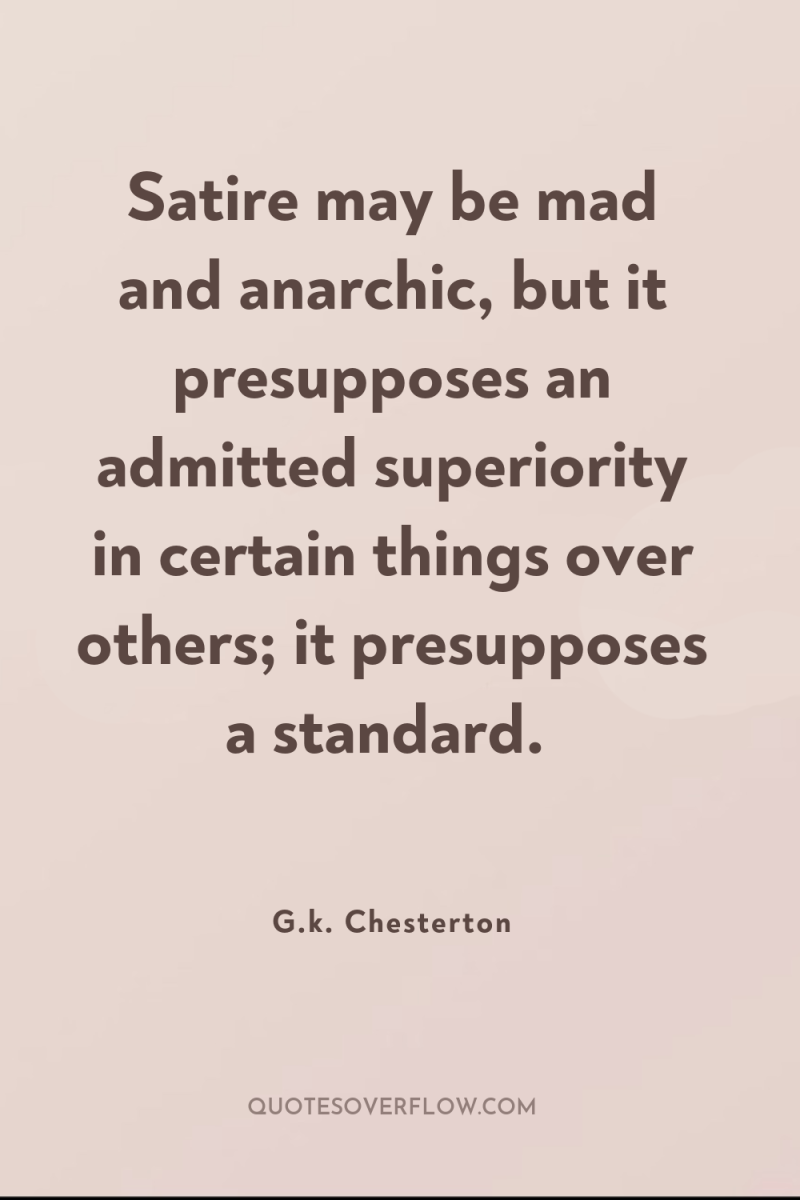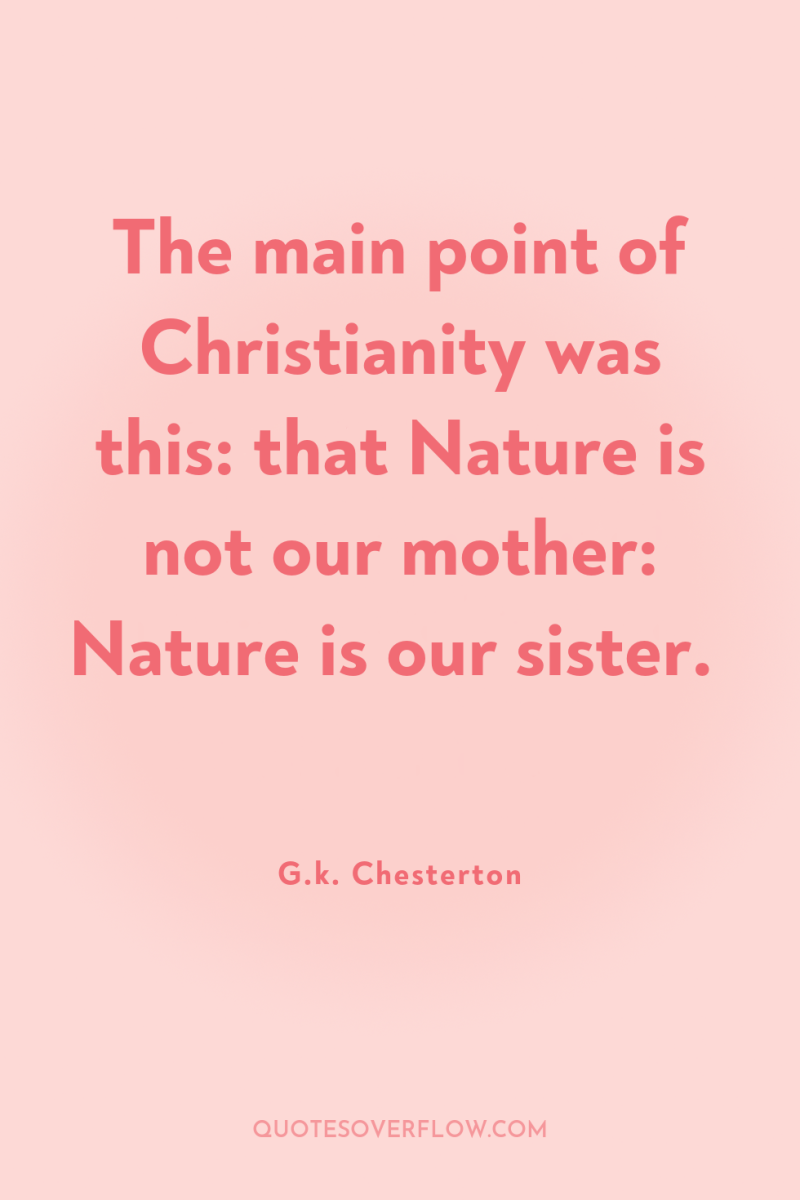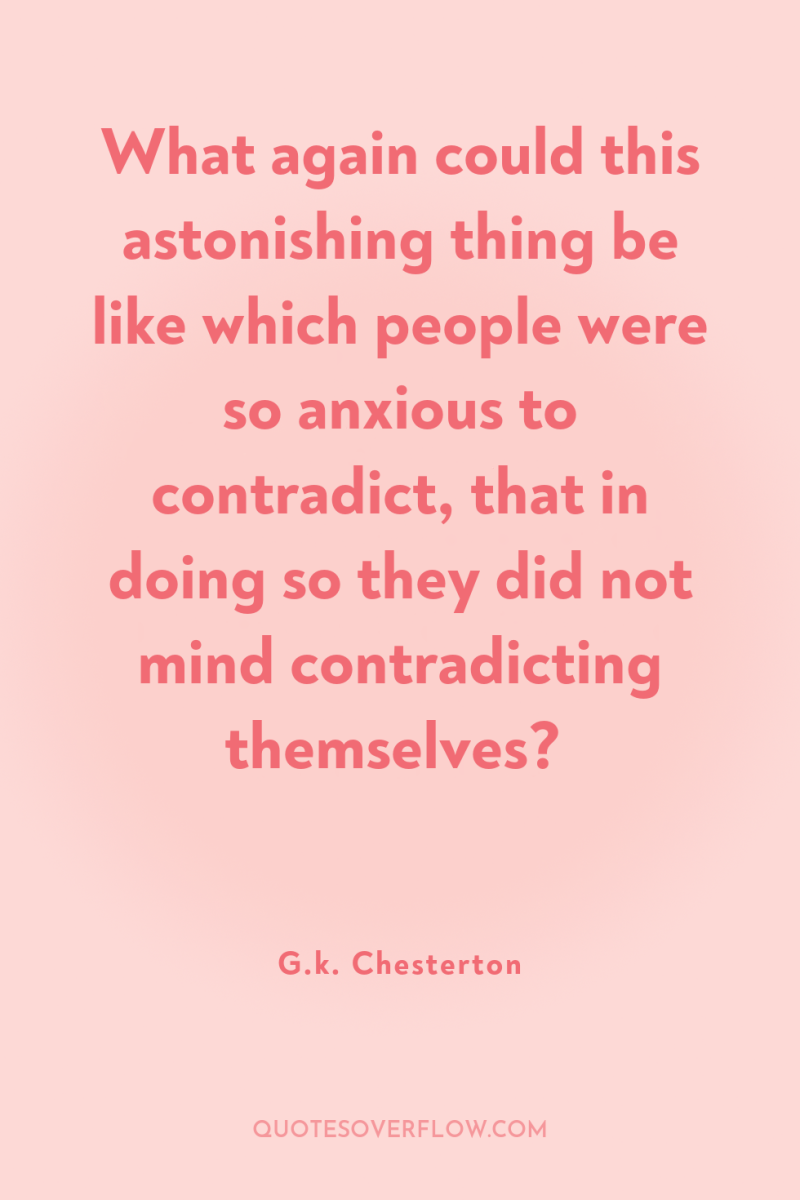
1
Love is not blind that is the last thing that it is. Love is bound and the more it is bound the less it is blind.G.k. Chesterton
2
Because children have abounding vitality, because they are in spirit fierce and free, therefore they want things repeated and unchanged. They always say, "Do it again"; and the grown-up person does it again until he is nearly dead. For grown-up people are not strong enough to exult in monotony. But perhaps God is strong enough to exult in monotony. It is possible that God says every morning, "Do it again" to the sun; and every evening, "Do it again" to the moon. It may not be automatic necessity that makes all daisies alike; it may be that God makes every daisy separately, but has never got tired of making them. It may be that He has the eternal appetite of infancy; for we have sinned and grown old, and our Father is younger than we. .G.k. Chesterton
3
He must not merely cling to life, for then he will be a coward, and will not escape. He must not merely wait for death, for then he will be a suicide, and will not escape. He must seek his life in a spirit of furious indifference to it.G.k. Chesterton
4
...even nursery tales only echo an almost pre-natal leap of interest and amazement. These tales say that apples were golden only to refresh the forgotten moment when we found that they were green. They make rivers run with wine only to make us remember, for one wild moment, that they run with water.G.k. Chesterton

5
The man who kills a man kills a man. The man who kills himself kills all men. As far as he is concerned, he wipes out the world.G.k. Chesterton
6
They said that I should lose my ideals and begin to believe in the methods of practical politicians. Now, I have not lost my ideals in the least; my faith in fundamentals is exactly what it always was. What I have lost is my childlike faith in practical politics.G.k. Chesterton
7
Tradition means giving votes to the most obscure of all classes, our ancestors. It is the democracy of the dead. Tradition refuses to submit to the small and arrogant oligarchy of those who merely happen to be walking about.G.k. Chesterton
8
According to most philosophers, God in making the world enslaved it. According to Christianity, in making it, He set it free. God had written, not so much a poem, but rather a play; a play he had planned as perfect, but which had necessarily been left to human actors and stage-managers, who had since made a great mess of it.G.k. Chesterton

9
Satire may be mad and anarchic, but it presupposes an admitted superiority in certain things over others; it presupposes a standard.G.k. Chesterton
10
A man who says that no patriot should attack the [war] until it is over is not worth answering intelligently; he is saying that no good son should warn his mother off a cliff until she has fallen over it. But there is an anti-patriot who honestly angers honest men…he is the uncandid candid friend; the man who says, "I am sorry to say we are ruined, " and is not sorry at all… Granted that he states only facts, it is still essential to know what are his emotions, what is his motive. It may be that twelve hundred men in Tottenham are down with smallpox; but we want to know whether this is stated by some great philosopher who wants to curse the gods, or only by some common clergyman who wants to help the men.G.k. Chesterton
11
Let us suppose we are confronted with a desperate thing — say Pimlico. If we think what is really best for Pimlico we shall find the thread of thought leads to the throne of the mystic and the arbitrary. It is not enough for a man to disapprove of Pimlico; in that case he will merely cut his throat or move to Chelsea. Nor, certainly, is it enough for a man to approve of Pimlico; for then it will remain Pimlico, which would be awful. The only way out of it seems to be for somebody to love Pimlico; to love it with a transcendental tie and without any earthly reason. If there arose a man who loved Pimlico, then Pimlico would rise into ivory towers and golden pinnacles… If men loved Pimlico as mothers love children, arbitrarily, because it is theirs, Pimlico in a year or two might be fairer than Florence. Some readers will say that this is mere fantasy. I answer that this is the actual history of mankind. This, as a fact, is how cities did grow great. Go back to the darkest roots of civilization and you will find them knotted round some sacred stone or encircling some sacred well. People first paid honour to a spot and afterwards gained glory for it. Men did not love Rome because she was great. She was great because they had loved her. .G.k. Chesterton
12
Poets do not go mad; but chess-players do. Mathematicians go mad, and cashiers; but creative artists very seldom. I am not, as will be seen, in any sense attacking logic: I only say that this danger does lie in logic, not in imagination.G.k. Chesterton

13
The main point of Christianity was this: that Nature is not our mother: Nature is our sister.G.k. Chesterton

14
What again could this astonishing thing be like which people were so anxious to contradict, that in doing so they did not mind contradicting themselves?G.k. Chesterton
15
To the Buddhist or the eastern fatalist, existence is a science or a plan, which must end up in a certain way. But to a Christian, existence is a STORY, which may end up in any way. In a thrilling novel (that purely Christian product) the hero is not eaten by cannibals; but it is essential to the existence of the thrill that he MIGHT be eaten by cannibals. The hero must (so to speak) be an eatable hero. So Christian morals have always said to the man, not that he would lose his soul, but that he must take care that he didn't. In Christian morals, in short, it is wicked to call a man "damned": but it is strictly religious and philosophic to call him damnable. All Christianity concentrates on the man at the cross-roads. The vast and shallow philosophies, the huge syntheses of humbug, all talk about ages and evolution and ultimate developments. The true philosophy is concerned with the instant. Will a man take this road or that? - that is the only thing to think about, if you enjoy thinking. .G.k. Chesterton
16
If you leave off looking at books about beasts and men, if you begin to look at beasts and men then (if you have any humour or imagination, any sense of the frantic or the farcical) you will observe that the startling thing is not how like man is to the brutes, but how unlike he is. It is the monstrous scale of his divergence that requires an explanation. That man and brute are like is, in a sense, a truism; but that being so like they should then be so insanely unlike, that is the shock and the enigma. That an ape has hands is far less interesting to the philosopher than the fact that having hands he does next to nothing with them; does not play knuckle-bones or the violin; does not carve marble or carve mutton. People talk of barbaric architecture and debased art. But elephants do not build colossal temples of ivory even in a roccoco style; camels do not paint even bad pictures, though equipped with the material of many camel's-hair brushes. Certain modern dreamers say that ants and bees have a society superior to ours. They have, indeed, a civilization; but that very truth only reminds us that it is an inferior civilization. Who ever found an ant-hill decorated with the statues of celebrated ants? Who has seen a bee-hive carved with the images of gorgeous queens of old? No; the chasm between man and other creatures may have a natural explanation, but it is a chasm. We talk of wild animals; but man is the only wild animal. It is man that has broken out. All other animals are tame animals; following the rugged respectability of the tribe or type. All other animals are domestic animals; man alone is ever undomestic, either as a profligate or a monk. So that this first superficial reason for materialism is, if anything, a reason for its opposite; it is exactly where biology leaves off that all religion begins.G.k. Chesterton
17
Those countries in Europe which are still influenced by priests, are exactly the countries where there is still singing and dancing and coloured dresses and art in the open-air. Catholic doctrine and discipline may be walls; but they are the walls of a playground. Christianity is the only frame which has preserved the pleasure of Paganism. We might fancy some children playing on the flat grassy top of some tall island in the sea. So long as there was a wall round the cliff's edge they could fling themselves into every frantic game and make the place the noisiest of nurseries. But the walls were knocked down, leaving the naked peril of the precipice. They did not fall over; but when their friends returned to them they were all huddled in terror in the centre of the island; and their song had ceased. .G.k. Chesterton
18
I felt in my bones; first, that this world does not explain itself. It may be a miracle with a supernatural explanation; it may be a conjuring trick, with a natural explanation. But the explanation of the conjuring trick, if it is to satisfy me, will have to be better than the natural explanations I have heard. The thing is magic, true or false. Second, I came to feel as if magic must have a meaning, and meaning must have some one to mean it. There was something personal in the world, as in a work of art; whatever it meant it meant violently. Third, I thought this purpose beautiful in its old design, in spite of its defects, such as dragons. Fourth, that the proper form of thanks to it is some form of humility and restraint: we should thank God for beer and Burgundy by not drinking too much of them. We owed, also, an obedience to whatever made us. And last, and strangest, there had come into my mind a vague and vast impression that in some way all good was a remnant to be stored and held sacred out of some primordial ruin. Man had saved his good as Crusoe saved his goods: he had saved them from a wreck.. And all this time I had not even thought of Christian theology.G.k. Chesterton
19
Art, like morality, consists of drawing the line somewhere.G.k. Chesterton
20
We have all read in scientific books, and, indeed, in all romances, the story of the man who has forgotten his name. This man walks about the streets and can see and appreciate everything; only he cannot remember who he is. Well, every man is that man in the story. Every man has forgotten who he is. One may understand the cosmos, but never the ego; the self is more distant than any star. Thou shalt love the Lord thy God; but thou shalt not know thyself. We are all under the same mental calamity; we have all forgotten our names. We have all forgotten what we really are. All that we call common sense and rationality and practicality and positivism only means that for certain dead levels of our life we forget that we have forgotten. All that we call spirit and art and ecstasy only means that for one awful instant we remember that we forgot. .G.k. Chesterton
21
Man is more himself, man is more manlike, when joy is the fundamental thing in him, and grief the superficial. Melancholy should be an innocent interlude, a tender and fugitive frame of mind; praise should be the permanent pulsation of the soul.G.k. Chesterton
22
, I found the whole modern world talking scientific fatalism; saying that everything is as it must alwayshave been, being unfolded without fault from the beginning. The leaf on the tree is green because it couldnever have been anything else. Now, the fairy-tale philosopher is glad that the leaf is green precisely becauseit might have been scarlet. He feels as if it had turned green an instant before he looked at it. .G.k. Chesterton
23
The ascetic remembrance of death is opposed to akedia, to anxiety, to depression, and becomes a powerful reminder of eternity, its joyful nostalgia.Paul Evdokimov
24
Man is more himself, more manlike, when joy is the fundamental thing and grief superficial.G.k. Chesterton
25
The point is not that this world is too sad to love or too glad not to love; the point is that when you do love a thing, its gladness is a reason for loving it, and its sadness a reason for loving it more.G.k. Chesterton
26
Imagination does not breed insanity. Exactly what does breed insanity is reason. Poets do not go mad; but chess-players do. Mathematicians go mad, and cashiers; but creative artists very seldom. I am not, as will be seen, in any sense attacking logic: I only say that this danger does lie in logic, not in imagination.G.k. Chesterton
27
Every act of will is an act of self-limitation. To desire action is to desire limitation. In that sense, every act is an act of self-sacrifice. When you choose anything, you reject everything else.G.k. Chesterton
28
Most of the machinery of modern language is labour-saving machinery; and it saves mental labour very much more than it ought. Scientific phrases are used like scientific wheels and piston-rods to make swifter and smoother yet the path of the comfortable. Long words go rattling by us like long railway trains. We know they are carrying thousands who are too tired or too indolent to walk and think for themselves. It is a good exercise to try for once in a way to express any opinion one holds in words of one syllable. If you say “The social utility of the indeterminate sentence is recognized by all criminologists as a part of our sociological evolution towards a more humane and scientific view of punishment, ” you can go on talking like that for hours with hardly a movement of the gray matter inside your skull. But if you begin “I wish Jones to go to gaol and Brown to say when Jones shall come out, ” you will discover, with a thrill of horror, that you are obliged to think. The long words are not the hard words, it is the short words that are hard. There is much more metaphysical subtlety in the word “damn” than in the word “degeneration.G.k. Chesterton
29
When the business man rebukes the idealism of his office-boy, it is commonly in some such speech as this: "Ah, yes, when one is young, one has these ideals in the abstract and these castles in the air; but in middle age they all break up like clouds, and one comes down to a belief in practical politics, to using the machinery one has and getting on with the world as it is." Thus, at least, venerable and philanthropic old men now in their honoured graves used to talk to me when I was a boy. But since then I have grown up and have discovered that these philanthropic old men were telling lies. What has really happened is exactly the opposite of what they said would happen. They said that I should lose my ideals and begin to believe in the methods of practical politicians. Now, I have not lost my ideals in the least; my faith in fundamentals is exactly what it always was. What I have lost is my old childlike faith in practical politics. I am still as much concerned as ever about the Battle of Armageddon; but I am not so much concerned about the General Election. As a babe I leapt up on my mother's knee at the mere mention of it. No; the vision is always solid and reliable. The vision is always a fact. It is the reality that is often a fraud. As much as I ever did, more than I ever did, I believe in Liberalism. But there was a rosy time of innocence when I believed in Liberals. .G.k. Chesterton
30
A man cannot think himself out of mental evil; for it is actually the organ of thought that has become diseased, ungovernable, and, as it were, independent. He can only be saved by will or faith. The moment his mere reason moves, it moves in the old circular rut; he will go round and round his logical circle.G.k. Chesterton
31
Now here comes in the whole collapse and huge blunder of our age. We have mixed up two different things, two opposite things. Progress should mean that we are always changing the world to suit the vision. Progress does mean (just now) that we are always changing the vision. It should mean that we are slow but sure in bringing justice and mercy among men: it does mean that we are very swift in doubting the desirability of justice and mercy: a wild page from any Prussian sophist makes men doubt it. Progress should mean that we are always walking towards the New Jerusalem. It does mean that the New Jerusalem is always walking away from us. We are not altering the real to suit the ideal. We are altering the ideal: it is easier.G.k. Chesterton
32
How can we say that the Church wishes to bring us back into the Dark Ages? The Church was the only thing that ever brought us out of them.G.k. Chesterton
33
And the more I considered Christianity, the more I found that while it had established a rule and order, the chief aim of of that order was to give room for good things to run wild.G.k. Chesterton
34
...but this is the real objection to that torrent of modern talk about treating crime as disease, about making prison merely a hygienic environment like a hospital, of healing sin by slow scientific methods. The fallacy of the whole thing is that evil is a matter of active choice whereas disease is not.G.k. Chesterton
35
Satan fell by the force of gravity.G.k. Chesterton
36
What we suffer from today is humility in the wrong place. Modesty has moved from the organ of ambition and settled upon the organ of conviction, where it was never meant to be. A man was meant to be doubtful about himself, but undoubting about the truth; this has been exactly reversed. We are on the road to producing a race of men too mentally modest to believe in the multiplication table.G.k. Chesterton
37
Children are grateful when Santa Claus puts in their stockings gifts of toys or sweets. Could I not be grateful to Santa Claus when he put in my stockings the gift of two miraculous legs? We thank people for birthday presents of cigars and slippers. Can I thank no one for the birthday present of birth?G.k. Chesterton
38
The Christian optimism is based on the fact that we do not fit in to the world.G.k. Chesterton
39
We do not admire, we hardly excuse, the fanatic who wrecks this world for love of the other but what are we to say of the fanatic who wrecks this world out of hatred for the other? He sacrifices the very existence of humanity's to the idleness of the altar and the emptiness of the throne. He is ready to ruin even that primary ethic by which all things live, for his strange and eternal vengeance upon someone who never lived at all.G.k. Chesterton
40
I still think sincere pessimism the unpardonable sin.G.k. Chesterton
41
As long as the vision of heaven is always changing, the vision of earth will be exactly the same. No ideal will remain long enough to be realized, or even partly realized. The modern young man will never change his environment; for he will always change his mind.G.k. Chesterton
42
Poetry is sane because it floats easily in an infinite sea; reason seeks to cross the infinite sea, and so make it finite. The result is mental exhaustion. To accept everything is an exercise, to understand everything a strain.G.k. Chesterton
43
An historic institution, which never went right, is really quite much of a miracle as an institution that cannot go wrong.G.k. Chesterton
44
The things common to all men are more important than the things peculiar to any men. Ordinary things are more valuable than extraordinary things; nay, they are more extraordinary. Man is something more awful than men; something more strange. The sense of the miracle of humanity itself should be always more vivid to us than any marvels of power, intellect, art, or civilization. The mere man on two legs, as such, should be felt as something more heartbreaking than any music and more startling than any caricature. Death is more tragic even than death by starvation. Having a nose is more comic even than having a Norman nose. This is the first principle of democracy: that the essential things in men are the things they hold in common, not the things they hold separately. And the second principle is merely this: that the political instinct or desire is one of these things which they hold in common. Falling in love is more poetical than dropping into poetry. The democratic contention is that government (helping to rule the tribe) is a thing like falling in love, and not a thing like dropping into poetry. It is not something analogous to playing the church organ, painting on vellum, discovering the North Pole (that insidious habit), looping the loop, being Astronomer Royal, and so on. For these things we do not wish a man to do at all unless he does them well. It is, on the contrary, a thing analogous to writing one's own love-letters or blowing one's own nose. These things we want a man to do for himself, even if he does them badly.G.k. Chesterton
45
The East is unfamiliar with those confessions, memoirs, and autobiographies so beloved in the West. There is a clear difference in tonality. One's gaze never lingers on the suffering humanity of Christ, but penetrates behind the kenotic veil. To the West's mysticism of the Cross and its veneration of the Sacred Heart corresponds the eastern mysticism of the sealed tomb, from which eternal life eternal wells up. .Paul Evdokimov
46
The man who cannot believe his senses, and the man who cannot believe anything else, are both insane, but their insanity is proved not by any error in their argument, but by the manifest mistake of their whole lives. They have both locked themselves up in two boxes, painted inside with the sun and stars; they are both unable to get out, the one into the health and happiness of heaven, the other even into the health and happiness of the earth.G.k. Chesterton
47
I said to him, "Shall I tell you where the men are who believe most in themselves? For I can tell you. I know of men who believe in themselves more colossally than Napoleon or Caesar. I know where flames the fixed star of certainty and success. I can guide you to the thrones of the Super-men. The men who really believe in themselves are all in lunatic asylums.G.k. Chesterton
48
The materialist is sure that history has been simply and solely a chain of causation, just as the [lunatic] is quite sure that he is simply and solely a chicken. Materialists and madmen never have doubts.G.k. Chesterton
49
The one created thing which we cannot look at is the one thing in the light of which we look at everything. Like the sun at noonday, mysticism explains everything else by the blaze of its own victorious invisibility. Detached intellectualism is (in the exact sense of a popular phrase) all moonshine; for it is light without heat, and it is secondary light, reflected from a dead world. But the Greeks were right when they made Apollo the god both of imagination and of sanity; for he was both the patron of poetry and the patron of healing. Of necessary dogmas and a special creed I shall speak later. But that transcendentalism by which all men live has primarily much the position of the sun in the sky. We are conscious of it as of a kind of splendid confusion; it is something both shining and shapeless, at once a blaze and a blur. But the circle of the moon is as clear and unmistakable, as recurrent and inevitable, as the circle of Euclid on a blackboard. For the moon is utterly reasonable; and the moon is the mother of lunatics and has given to them all her name.G.k. Chesterton
50
[The materialist] thinks me a slave because I am not allowed to believe in determinism. I think [the materialist] a slave because he is not allowed to believe in fairies.G.k. Chesterton